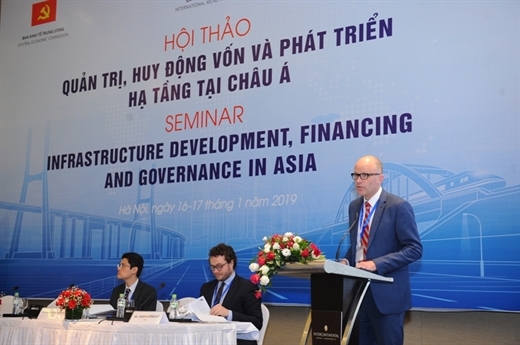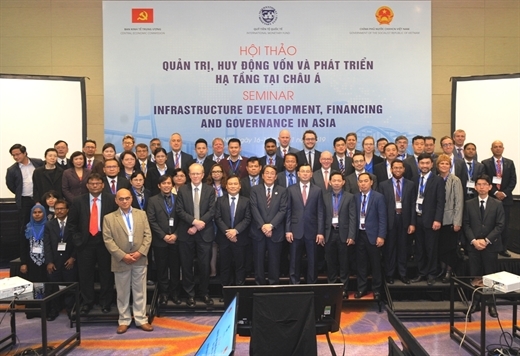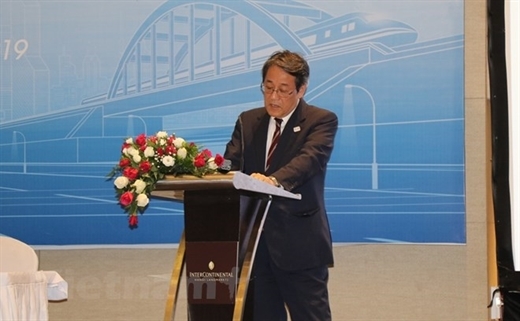Australia supports Economic Reform in Vietnam (Aus4Reform)
- en
- News and Media
- Aus4Reform News
- ‘Historical moment for Vietnam to develop prosperous economy’
22/1/2019
‘Historical moment for Vietnam to develop prosperous economy’
“In recent years, the Vietnam Government has paid attention to promoting the attraction of private investment, especially through the model of public-private partnerships - PPP, currently deployed 147 projects with a total investment of about VND 1.14 quadrillion (equivalent to USD 52 billion). Projects having investment resources from the private sector are contributing to significantly improving the quality of infrastructure systems in Vietnam”.
‘Historical moment for Vietnam to develop prosperous economy’
“In recent years, the Vietnam Government has paid attention to promoting the attraction of private investment, especially through the model of public-private partnerships - PPP, currently deployed 147 projects with a total investment of about VND 1.14 quadrillion (equivalent to USD 52 billion). Projects having investment resources from the private sector are contributing to significantly improving the quality of infrastructure systems in Vietnam”.
This is the comment of Deputy Minister Vu Dai Thang, Ministry of Planning and Investment at the Dicussion session "Infastructure development, Financing and Governance - International experience and policy recommendations for Vietnam" in the framework of the Vietnam Economic Forum 2019 (VEF) organized by the Government of Vietnam and the Central Economic Commission in collaboration with Aus4Reform Program (Australia supports Vietnam's economic reform Program), on November 16, in Hanoi.
 |
| Discussion session "Infastructure development, Financing and Governance - International experience and policy recommendations for Vietnam" at the Vietnam Economic Forum in 2019 |
At the workshop, there are senior experts from a number of Vietnamese ministries and agencies and representatives of management agencies in Asia and the International Monetary Funds, World Bank, Asian Development Bank ... and Australian Embassy, Embassy of Japan.
Here, the experts exchanged and evaluated the current situation and trend of infrastructure development in the future of the region in general and Vietnam in particular, thereby giving solutions to innovate the management and development mechanism in line with international practices and standards to improve the efficiency of infrastructuregovernance, investment and development to meet the growth needs of each country.
Lack of transparency and professionalism in deployment
Not only for Vietnam, infrastructure always plays an important role in socio-economic development in all countries and even very important in improving the business environment and making motivation for fast growtheconomy in developing countries.
On that basis, Vietnam as well as other countries in the region always prioritize the infrastructure development to meet the socio-economic advancement objectives and has created a significant improvement in quantity and quality of infrastructure associated with institutional reforms, capital mobilization and finance for infrastructure development increasingly standardized and more effective.
However, in the process of implementation, each country has got into certain problems and limitations in the development of infrastructure systems, especially in management, mobilization, encouraging the participation of private economic sector, investment quality and efficiency, in which public investment is not high.
 |
| Delegates attended the Vietnam Economic Forum 2019, January 16, in Hanoi. |
At here, Deputy Minister of Planning and Investment also frankly pointed out the issues of Vietnam: “Although the Government, all levels and branches of Vietnam have made great efforts in the past time, but still existing many challenges to Vietnam's infrastructure development in the coming time. ”
Specifically, the Deputy Minister identified four difficult issues that need to be solved. Firstly, the size of Vietnam's economy is not large, thus, the limited accumulation capacity leads to maintaining high investment level from The State budget, which will create great pressure for ensuring macro-balances, affecting the overall development of the whole economy.
Secondly, the pressure of the public debt ceiling is increasing and Vietnam has become a middle-income country, which means foreign loans for developing infrastructure are declining and preferential capital must pay higher interest rates.
Thirdly, maintaining and reforming institutions, reforming administrative procedures to improve the investment environment, attracting social resources for investment in infrastructure development is a big challenge for the whole economy.
Fourthly, the necessary conditions to attract investment resources from the private sector for infrastructure systems through the public-private partnership investment model are still limited.The reason is that the State has not enough financial resources to participate,and weak implementation capacity, policy mechanisms are not synchronous and strong enough, lack of security mechanisms, guarantees and risk sharing with the investors (such as revenue risk, foreign currency risk ...) is accompanied by a lack of professionalism and transparency in the market.
Legal framework towards international standards
Therefore, at the discussion session, experienced regional experts and international organizations focused on exchanging international practices, standards and national lessons learned about reform and infrastructure development, especially management and capital mobilization.
Specifically, the content includes outstanding issues such as "Infrastructure management framework," which summarizes the trends of public investment and public-private cooperation in Asia, comprehensive infrastructure governance framework, covering the entire public investment cycle and common challenges in infrastructure management in Asia.
In general, speakers noted and appreciated the recent efforts of the Government of Vietnam to develop infrastructure as well as the current reforms on infrastructure management.
 |
| Mr. Kunio Umeda, Japanese Ambassador in Vietnam highly appreciated the Vietnamese Government's strict management of loans, especially from foreign donors. |
Besides, the speakers shared, solutions to mobilize capital for infrastructure in Asia so far still rely on the Government budget and borrow from bilateral offices and multilateral banks. And, with challenges related to these traditional sources of capital, governments need to expand access to modern methods of capital mobilization, more toward the private sector, including from mobilizing bond capital and from infrastructure funds to mobilizing capital through public-private partnerships.
In fact, most Asian countries have been pushing for public-private partnerships over the past 15 years, when fiscal space in countries is becoming increasingly limited. However, the public-private partnership mechanism opens up opportunities for infrastructure development, but new risks also arise. Therefore, countries need to develop an appropriate legal framework based on experience from some of the best practices to be able to manage effectively.
At the discussion session, good practices on ensuring appraisal and transparent selection of public-private projects discussed by speakers, such as cost and benefit assessment methodologies, assessment methodologies of effective capital use, set up a "gateway" method to select projects and establish selection criteria of transparent public-private project.
In addition, in order for infrastructure projects to be implemented on schedule and to ensure economic efficiency (avoid capital and slow progress), the speakers emphasized that Governments should ensure sufficient capital for projects, transparent monitoring and effective project management, controlling challenges related to implementation in the infrastructure development cycle. It cannot be denied that the reform of public infrastructure management is a complex effort, because of reform priorities that need to strengthen capacities in the fields.
At the seminar, Mr. Kunio Umeda, Japanese Ambassador in Vietnam highly appreciated the Vietnamese Government's strict management of loans, especially from foreign donors.
“I believe, the investment capital has been used effectively but the Government of Vietnam must also have better solutions in public debt management. Japan is committed to supporting Vietnam and also believes that Vietnam is fully capable of developing a prosperous economy. This is a historic time for Vietnam to achieve important and sustainable development milestones,” said Kunio Umeda.

